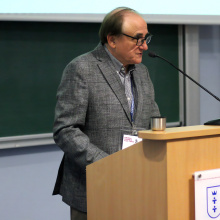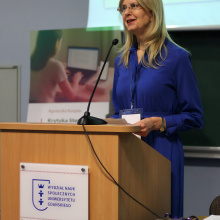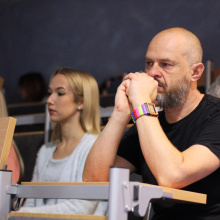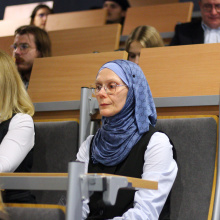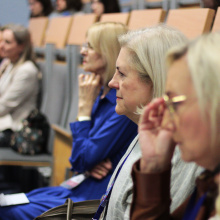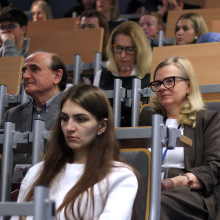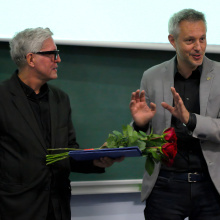The 10th Jubilee International Conference MEDIA-BUSINESS-CULTURE. Pomerania 2025 brought together over 70 guests from academic centers in Poland and abroad. The event featured a wide range of activities, including plenary lectures, the celebration of 35 years of creative work by Professor Zbigniew Treppa, a debate on public media, discussions within media subpanels, a screening of the film The Grave, the Media@stery competition awards ceremony, and the 7th National Seminar of the Forum of Young Media and Communication Scholars of the Polish Communication Association.
MEDIA-BUSINESS-CULTURE is an international academic conference held biennially and organized by the Institute of Media, Journalism and Social Communication at the University of Gdańsk. It brings together scholars from Poland and abroad, representatives of business, media professionals, and cultural institutions cooperating with the media. It is one of the most significant meetings of theorists and practitioners and serves as a forum for exchanging views on ethical, technological, cultural, and market processes related to social communication and media.
The 10th Jubilee edition focused on inclusivity in media and communication.
The conference was officially opened by Assoc. Prof. Urszula Patocka-Sigłowa, Vice-Rector for Student Affairs of the University of Gdańsk, and Prof. Michał Harciarek, Dean of the Faculty of Social Sciences.
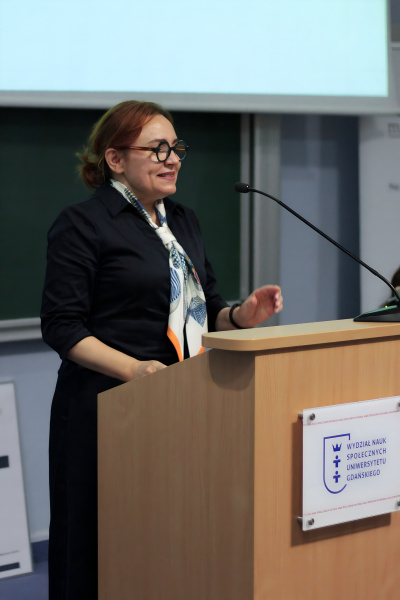
The opening address was delivered by Assoc. Prof. Małgorzata Łosiewicz, Director of the Institute of Media, Journalism and Social Communication at the University of Gdańsk. She emphasized the conference’s theme and its anniversary character: - “In the space of Gdańsk – a city open to new ideas – we can meet and share experience, knowledge, and an innovative approach to contemporary challenges. Innovation, however, is not only an economic category but also a social and cultural one – dependent on trust, cooperation, and the exchange of ideas. This message is close to us. We want to talk about innovation that does not exclude but includes, about development that arises from encounter, not competition,” she underlined.
Plenary lectures were delivered by: Prof. Iwona Hofman (Maria Curie-Skłodowska University in Lublin), Prof. Stanisław Jędrzejewski (Kozminski University), Editor Alina Kietrys, Prof. Jadwiga Woźniak-Kasperek (University of Warsaw), Prof. Józef Majewski (University of Gdańsk), Assoc. Prof. Katarzyna Kopecka-Piech, Dr Kamil Fil, and Julia Parafiniuk (Maria Curie-Skłodowska University in Lublin). The lectures addressed such topics as public media, the millennial generation in media, the integrative nature of media and communication studies, the condition of modern journalism, and pop culture in the media. In line with the conference’s guiding idea, the plenaries formed a broad debate on inclusivity in media and communication—understood as the representation of diverse social groups, open access to information, and active participation in public debate.
A highlight of the conference was the celebration of 35 years of creative work by Prof. Zbigniew Treppa in the field of photomedia art devoted to the sacred sphere. A laudation was delivered by Prof. Józef Majewski, and a special lecture titled “The Sacred in Contemporary Art” by Dr Roman Nieczyporowski. For his contribution to the development of the University, Prof. Treppa was honored with the Silver Medal of the University of Gdańsk – Doctrinae Sapientiae Honestati.
Guests also attended the exhibition “HaDerech – The Way”, opened by Assoc. Prof. Karolina Aszyk-Treppa, who, together with Prof. Treppa, founded the Gallery 301 at the Faculty of Social Sciences, University of Gdańsk.
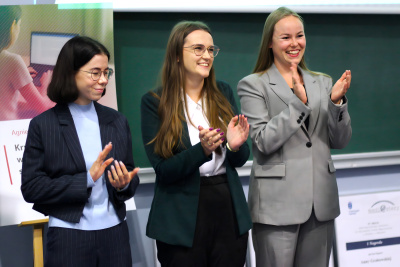
An important part of the conference was the Media@stery National Competition Awards for the best master’s thesis in media studies, organized annually by the Institute. The first prize in the 11th edition went to Anna Grabowska for the thesis “Art Branding – Promotion Through Art. Characteristics and Analysis of the Phenomenon Based on Selected Examples” (supervisor: Assoc. Prof. Weronika Świerczyńska-Głownia, Jagiellonian University). The second prize was awarded to Anna Kulma for “Social Media as an Institution of Political Socialization: The Case of Polish Youth Wings of Political Parties” (supervisor: Prof. Agnieszka Hess, Jagiellonian University).
The third prize went to Agata Myszka for “Changes in the Language of Polish Job Advertisements 1995–2024. A Comparative Analysis” (supervisor: Assoc. Prof. Magdalena Hodalska, Jagiellonian University). Awards were presented by Prof. Małgorzata Łosiewicz and Assoc. Prof. Anna Ryłko-Kurpiewska, Deputy Director of the Institute. The discussion with the laureates was led by Paulina Kozień, a journalism student at UG. The first-prize winner’s thesis is traditionally published as a book, and during the ceremony, a fragment from the previous year’s winning work was read: Agnieszka Kurpias’s “Literary Criticism in Social Media” (supervisor: Prof. Iwona Hofman, Maria Curie-Skłodowska University, Lublin).
The conference also featured an open debate on public media, titled “The Battle for Inclusivity. What’s Next for Public Media?”, moderated by Dr Monika Białek and Dr Konrad Knoch (University of Gdańsk). Experts included Prof. Stanisław Jędrzejewski, Editor Mariusz Szmidka (Zawsze Pomorze), Prof. Iryna Ivanova (Simon Kuznets Kharkiv National University of Economics), and Profs. Yuliya and Yurij Nesteriak (Taras Shevchenko National University of Kyiv).
The core of the conference were the scientific panels, which, for this 10th jubilee edition, adopted a new format—media subpanels. As Prof. Łosiewicz noted: - “By introducing media subpanels, we embraced the idea of a ‘slow conference’, inspired by the ‘slow science’ movement. While fast-paced research is important, we also need time to think, read, discuss, and develop ideas. Our goal is a culture of reflection and cooperation that benefits both science and society.”
The subpanels addressed key current issues in the field of media:
- How to Talk Inclusively About History, Culture, and Art? (moderator: Dr Konrad Knoch)
- Media and Sustainable Development – Challenges and Competences for the Future (moderator: Dr Beata Czechowska-Derkacz, University of Gdańsk)
- Political Communication: Threats to the Democratic System (moderators: Dr Michalina Ahmad, Dr Grzegorz Kapuściński, Dr Dominika Rafalska, Assoc. Prof. Jacek Wojsław, University of Gdańsk)
- Media Education as a Tool Against Exclusion (moderator: Assoc. Prof. Klaudia Cymanow-Sosin, Pontifical University of John Paul II)
- Communication in Liturgy: Contemporary Challenges for Visuality in Worship (moderator: Prof. Zbigniew Treppa).
As part of the subpanel Media and Sustainable Development, a session summarized the international project SUMED – Sustainable Multidimensional Media Contents, implemented at the University of Gdańsk under the Erasmus+ Programme, led by Dr Beata Czechowska-Derkacz (University of Gdańsk). The meeting included presentations on integrating sustainable development goals into the media environment and sharing project experiences and best practices. Participants included representatives from all partner universities: Prof. Ġorġ Mallia, Dr Monika Masłowska (University of Malta), Milla Järvipetäjä (Turku University of Applied Sciences), Dr Julio González Liendo (Universitat Politècnica de València), Dr Dominik Chomik (University of Gdańsk), and the project leader INNOCAMP PL. The session was introduced by Assoc. Prof. Sylwia Mrozowska, Director of the Centre for Sustainable Development, University of Gdańsk, with the presentation “Sustainable Development as a Civilizational Challenge. Are Universities Ready for It?”
The first day concluded with a screening of The Grave, directed by Allie Wharf, followed by a discussion with cinematographer Oleksij Yeroshenko, moderated by Dr Dominika Rafalska (University of Gdańsk). The conference ended with the 7th National Seminar of the Forum of Young Media and Communication Scholars of the Polish Communication Association.
The organization and media coverage of the event were supported by students of journalism and social communication at UG, especially members of student media outlets: Radio MORS, CDN Internet Portal, and Neptun TV.

